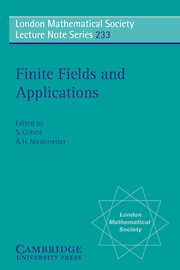 Finite Fields and Applications
Finite Fields and Applications Book contents
- Frontmatter
- Contents
- Preface
- Conference Participants
- Factorizations over finite fields
- Class number in totally imaginary extensions of totally real function fields
- Automorphism groups and permutation groups of affine-invariant codes
- A construction of bent functions
- Monodromy groups of classical families over finite fields
- Wan's bound for value sets of polynomials
- Comparative implementations of Berlekamp's and Niederreitor's polynomial factorization algorithms
- On the minimal polynomials for certain Gauss periods over finite fields
- Completely free elements
- Exponential sums over Galois rings and their applications
- Maximal sets of mutually orthogonal Latin squares
- Examples of small hybrid sums
- Cellular automata, substitutions and factorization of polynomials over finite fields
- A new class of two weight codes
- Construction of digital (t, m, s)-nets from linear codes
- A family of exceptional polynomials in characteristic three
- Estimates of character sums arising from finite upper half planes
- Carmichael-Carlitz polynomials and Fermat-Carlitz quotients
- Open problems and conjectures in finite fields
- Quasirandom points and global function fields
- Use characteristic sets to decode cyclic codes up to actual minimum distance
- Approximate constructions in finite fields
- Periodicity properties of kth order linear recurrences whose characteristic polynomial splits completely over a finite field, II
- Factoring cyclotomic polynomials over large finite fields
- Character sums and coding theory
- L-functions of algebraic varieties over finite fields: rationality, meromorphy and entireness
- Some congruences and identities for generalizations of Rédei functions
Comparative implementations of Berlekamp's and Niederreitor's polynomial factorization algorithms
Published online by Cambridge University Press: 29 September 2009
- Frontmatter
- Contents
- Preface
- Conference Participants
- Factorizations over finite fields
- Class number in totally imaginary extensions of totally real function fields
- Automorphism groups and permutation groups of affine-invariant codes
- A construction of bent functions
- Monodromy groups of classical families over finite fields
- Wan's bound for value sets of polynomials
- Comparative implementations of Berlekamp's and Niederreitor's polynomial factorization algorithms
- On the minimal polynomials for certain Gauss periods over finite fields
- Completely free elements
- Exponential sums over Galois rings and their applications
- Maximal sets of mutually orthogonal Latin squares
- Examples of small hybrid sums
- Cellular automata, substitutions and factorization of polynomials over finite fields
- A new class of two weight codes
- Construction of digital (t, m, s)-nets from linear codes
- A family of exceptional polynomials in characteristic three
- Estimates of character sums arising from finite upper half planes
- Carmichael-Carlitz polynomials and Fermat-Carlitz quotients
- Open problems and conjectures in finite fields
- Quasirandom points and global function fields
- Use characteristic sets to decode cyclic codes up to actual minimum distance
- Approximate constructions in finite fields
- Periodicity properties of kth order linear recurrences whose characteristic polynomial splits completely over a finite field, II
- Factoring cyclotomic polynomials over large finite fields
- Character sums and coding theory
- L-functions of algebraic varieties over finite fields: rationality, meromorphy and entireness
- Some congruences and identities for generalizations of Rédei functions
Summary
Abstract
New C++-implementations of the classical factorization algorithms for polynomials over finite fields of Berlekamp and the new ones of Niederreiter are presented. Their performances on various types of inputs are compared.
Introduction
The basic problem of factorizing univariate polynomials over the finite field Fq has got new impulses in the past few years with a new linearization technique developed by Niederreiter in [8], [9], [10]. Unlike Berlekamp's classical approach, which uses the Frobenius fixed point algebra in A := Fq[X]/(f) (where f is the polynomial to be factored), Niederreiter's method is based on the analysis of the solution space of certain differential equations in the field of rational functions Fq(X).
From the very beginning there have been several striking similarities between Niederreiter's and Berlekamp's algorithms in each step. Suppose for simplicity that the polynomial is monic and squarefree. Then in both algorithms a certain system of linear equations has to be set up and solved, leading to an Fq - subspace S of A, whose dimension coincides with the number of irreducible factors of f. Now the elements of S can be used to extract the irreducible factors of f by suitable gcd operations.
Niederreiter's algorithm has the following practical advantages: In the case of small fields the linear equations to be solved can be set up very efficiently. In particular in F2 they can be read off directly from the coefficients of f.
- Type
- Chapter
- Information
- Finite Fields and ApplicationsProceedings of the Third International Conference, Glasgow, July 1995, pp. 73 - 84Publisher: Cambridge University PressPrint publication year: 1996
- 2
- Cited by
